- Home
- Michael Swanwick
The Year's Best Science Fiction (2008 Edition) Page 2
The Year's Best Science Fiction (2008 Edition) Read online
Page 2
While I was waiting for Yuen to reply, I scoured the logs where my knowledge miner deposited results of marginal relevance, wondering if some flaw in the criteria I'd given it might have left me with a blind spot. If anyone, anywhere had announced their intention to carry out some kind of calculation that might have led them to the defect, the news should have been plastered across my desktop in flashing red letters within seconds. Granted, most organizations with the necessary computing resources were secretive by nature, but they were also unlikely to be motivated to indulge in such a crazy stunt. Luminous itself had been deommissioned in 2012; in principle, various national security agencies, and even a few IT-centric businesses, now had enough silicon to hunt down the defect if they'd really set their sights on it, but as far as I knew Yuen, Alison, and I were still the only three people in the world who were certain of its existence. The black budgets of even the most profligate governments, the deep pockets of even the richest tycoons, would not stretch far enough to take on the search as a long shot, or an act of whimsy.
An IM window popped up with Alison's face. She looked ragged. “What time is it there?” I asked.
“Early. Laura's got colic.”
“Ah. Are you okay to talk?”
“Yeah, she's asleep now.”
My email had been brief, so I filled her in on the details. She pondered the matter in silence for a while, yawning unashamedly.
“The only thing I can think of is some gossip I heard at a conference in Rome a couple of months ago. It was a fourth-hand story about some guy in New Zealand who thinks he's found a way to test fundamental laws of physics by doing computations in number theory.”
“Just random crackpot stuff, or ... what?”
Alison massaged her temples, as if trying to get more blood flowing to her brain. “I don't know, what I heard was too vague to make a judgment. I gather he hasn't tried to publish this anywhere, or even mentioned it in blogs. I guess he just confided in a few people directly, one of whom must have found it too amusing for them to keep their mouth shut.”
“Have you got a name?”
She went off camera and rummaged for a while. “Tim Campbell,” she announced. Her notes came through on the data channel. “He's done respectable work in combinatorics, algorithmic complexity, optimization. I scoured the net, and there was no mention of this weird stuff. I was meaning to email him, but I never got around to it.”
I could understand why; that would have been about the time Laura was born. I said, “I'm glad you still go to so many conferences in the flesh. It's easier in Europe, everything's so close.”
“Ha! Don't count on it continuing, Bruno. You might have to put your fat arse on a plane sometime yourself.”
“What about Yuen?”
Alison frowned. “Didn't I tell you? He's been in hospital for a couple of days. Pneumonia. I spoke to his daughter; he's not in great shape.”
“I'm sorry.” Alison was much closer to him than I was; he'd been her doctoral supervisor, so she'd known him long before the events that had bound the three of us together.
Yuen was almost eighty. That wasn't yet ancient for a middle-class Chinese man who could afford good medical care, but he would not be around forever.
I said, “Are we crazy, trying to do this ourselves?” She knew what I meant: liaising with Sam, managing the border, trying to keep the two worlds talking but the two sides separate, safe and intact.
Alison replied, “Which government would you trust not to screw this up? Not to try to exploit it?”
“None. But what's the alternative? You pass the job on to Laura? Kate's not interested in having kids. So do I pick some young mathematician at random to anoint as my successor?”
“Not at random, I'd hope.”
“You want me to advertise? ‘Must be proficient in number theory, familiar with Machiavelli, and own the complete boxed set of The West Wing?'”
She shrugged. “When the time comes, find someone competent you can trust. It's a balance: the fewer people who know, the better, so long as there are always enough of us that the knowledge doesn't risk getting lost completely.”
“And this goes on generation after generation? Like some secret society? The Knights of the Arithmetic Inconsistency?”
“I'll work on the crest.”
We needed a better plan, but this wasn't the time to argue about it. I said, “I'll contact this guy Campbell and let you know how it goes.”
“Okay. Good luck.” Her eyelids were starting to droop.
“Take care of yourself.”
Alison managed an exhausted smile. “Are you saying that because you give a damn, or because you don't want to end up guarding the Grail all by yourself?”
“Both, of course.”
* * * *
“I have to fly to Wellington tomorrow.”
Kate put down the pasta-laden fork she'd raised halfway to her lips and gave me a puzzled frown. “That's short notice.”
“Yeah, it's a pain. It's for the Bank of New Zealand. I have to do something on-site with a secure machine, one they won't let anyone access over the net.”
Her frown deepened. “When will you be back?”
“I'm not sure. It might not be until Monday. I can probably do most of the work tomorrow, but there are certain things they restrict to the weekends, when the branches are off-line. I don't know if it will come to that.”
I hated lying to her, but I'd grown accustomed to it. When we'd met, just a year after Shanghai, I could still feel the scar on my arm where one of Industrial Algebra's hired thugs had tried to carve a data cache out of my body. At some point, as our relationship deepened, I'd made up my mind that however close we became, however much I trusted her, it would be safer for Kate if she never knew anything about the defect.
“They can't hire someone local?” she suggested. I didn't think she was suspicious, but she was definitely annoyed. She worked long hours at the hospital, and she only had every second weekend off; this would be one of them. We'd made no specific plans, but it was part of our routine to spend this time together.
I said, “I'm sure they could, but it'd be hard to find someone at short notice. And I can't tell them to shove it, or I'll lose the whole contract. It's one weekend, it's not the end of the world.”
“No, it's not the end of the world.” She finally lifted her fork again.
“Is the sauce okay?”
“It's delicious, Bruno.” Her tone made it clear that no amount of culinary effort would have been enough to compensate, so I might as well not have bothered.
I watched her eat with a strange knot growing in my stomach. Was this how spies felt, when they lied to their families about their work? But my own secret sounded more like something from a psychiatric ward. I was entrusted with the smooth operation of a treaty that I, and two friends, had struck with an invisible ghost world that coexisted with our own. The ghost world was far from hostile, but the treaty was the most important in human history, because either side had the power to annihilate the other so thoroughly that it would make a nuclear holocaust seem like a pinprick.
* * * *
Victoria University was in a hilltop suburb overlooking Wellington. I caught a cable car, and arrived just in time for the Friday afternoon seminar. Contriving an invitation to deliver a paper here myself would have been difficult, but wangling permission to sit in as part of the audience was easy; although I hadn't been an academic for almost twenty years, my ancient Ph.D. and a trickle of publications, however tenuously related to the topic of the seminar, were still enough to make me welcome.
I'd taken a gamble that Campbell would attend—the topic was peripheral to his own research, official or otherwise—so I was relieved to spot him in the audience, recognizing him from a photo on the faculty web site. I'd emailed him straight after I'd spoken to Alison, but his reply had been a polite brush-off: he acknowledged that the work I'd heard about on the grapevine owed something to the infamous search that Alison and I ha
d launched, but he wasn't ready to make his own approach public.
I sat through an hour on “Monoids and Control Theory,” trying to pay enough attention that I wouldn't make a fool of myself if the seminar organizer quizzed me later on why I'd been sufficiently attracted to the topic to interrupt my “sightseeing holiday” in order to attend. When the seminar ended, the audience split into two streams: one heading out of the building, the other moving into an adjoining room where refreshments were on offer. I saw Campbell making for the open air, and it was all I could do to contrive to get close enough to call out to him without making a spectacle.
“Dr. Campbell?”
He turned and scanned the room, probably expecting to see one of his students wanting to beg for an extension on an assignment. I raised a hand and approached him.
“Bruno Costanzo. I emailed you yesterday.”
“Of course.” Campbell was a thin, pale man in his early thirties. He shook my hand, but he was obviously taken aback. “You didn't mention that you were in Wellington.”
I made a dismissive gesture. “I was going to, but then it seemed a bit presumptuous.” I didn't spell it out, I just left him to conclude that I was as ambivalent about this whole inconsistency nonsense as he was.
If fate had brought us together, though, wouldn't it be absurd not to make the most of it?
“I was going to grab some of those famous scones,” I said; the seminar announcement on the web had made big promises for them. “Are you busy?”
“Umm. Just paperwork. I suppose I can put it off.”
As we made our way into the tea room, I waffled on airily about my holiday plans. I'd never actually been to New Zealand before, so I made it clear that most of my itinerary still lay in the future. Campbell was no more interested in the local geography and wildlife than I was; the more I enthused, the more distant his gaze became. Once it was apparent that he wasn't going to cross-examine me on the finer points of various hiking trails, I grabbed a buttered scone and switched subject abruptly.
“The thing is, I heard you'd devised a more efficient strategy for searching for a defect.” I only just managed to stop myself from using the definite article; it was a while since I'd spoken about it as if it were still hypothetical. “You know the kind of computing power that Dr. Tierney and I had to scrounge up?”
“Of course. I was just an undergraduate, but I heard about the search.”
“Were you one of our volunteers?” I'd checked the records, and he wasn't listed, but people had had the option of registering anonymously.
“No. The idea didn't really grab me, at the time.” As he spoke, he seemed more discomfited than the failure to donate his own resources twelve years ago really warranted. I was beginning to suspect that he'd actually been one of the people who'd found the whole tongue-in-cheek conjecture that Alison and I had put forward to be unforgivably foolish. We had never asked to be taken seriously—and we had even put prominent links to all the worthy biomedical computing projects on our web page, so that people knew there were far better ways to spend their spare megaflops—but nonetheless, some mathematical/philosophical stuffed shirts had spluttered with rage at the sheer impertinence and naïvety of our hypothesis. Before things turned serious, it was the entertainment value of that backlash that had made our efforts worthwhile.
“But now you've refined it somehow?” I prompted him, doing my best to let him see that I felt no resentment at the prospect of being outdone. In fact, the hypothesis itself had been Alison's, so even if there hadn't been more important things than my ego at stake, that really wasn't a factor. As for the search algorithm, I'd cobbled it together on a Sunday afternoon, as a joke, to call Alison's bluff. Instead, she'd called mine, and insisted that we release it to the world.
Campbell glanced around to see who was in earshot, but then perhaps it dawned on him that if the news of his ideas had already reached Sydney via Rome and Zürich, the battle to keep his reputation pristine in Wellington was probably lost.
He said, “What you and Dr. Tierney suggested was that random processes in the early universe might have included proofs of mutually contradictory theorems about the integers, the idea being that no computation to expose the inconsistency had yet had time to occur. Is that a fair summary?”
“Sure.”
“One problem I have with that is, I don't see how it could lead to an inconsistency that could be detected here and now. If the physical system A proved theorem A, and the physical system B proved theorem B, then you might have different regions of the universe obeying different axioms, but it's not as if there's some universal mathematics textbook hovering around outside spacetime, listing every theorem that's ever been proved, which our computers then consult in order to decide how to behave. The behavior of a classical system is determined by its own particular causal past. If we're the descendants of a patch of the universe that proved theorem A, our computers should be perfectly capable of disproving theorem B, whatever happened somewhere else fourteen billion years ago.”
I nodded thoughtfully. “I can see what you're getting at.” If you weren't going to accept full-blooded Platonism, in which there was a kind of ghostly textbook listing the eternal truths of mathematics, then a half-baked version where the book started out empty and was only filled in line-by-line as various theorems were tested seemed like the worst kind of compromise. In fact, when the far side had granted Yuen, Alison, and I insight into their mathematics for a few minutes in Shanghai, Yuen had proclaimed that the flow of mathematical information did obey Einstein locality; there was no universal book of truths, just records of the past sloshing around at lightspeed or less, intermingling and competing.
I could hardly tell Campbell, though, that not only did I know for a fact that a single computer could prove both a theorem and its negation, but depending on the order in which it attacked the calculations it could sometimes even shift the boundary where one set of axioms failed and the other took over.
I said, “And yet you still believe it's worth searching for an inconsistency?”
“I do,” he conceded. “Though I came to the idea from a very different approach.” He hesitated, then picked up a scone from the table beside us.
“One rock, one apple, one scone. We have a clear idea of what we mean by those phrases, though each one might encompass ten-to-the-ten-to-the-thirty-something slightly different configurations of matter. My ‘one scone’ is not the same as your ‘one scone.'”
“Right.”
“You know how banks count large quantities of cash?”
“By weighing them?” In fact there were several other cross-checks as well, but I could see where he was heading and I didn't want to distract him with nit-picking.
“Exactly. Suppose we tried to count scones the same way: weigh the batch, divide by some nominal value, then round to the nearest integer. The weight of any individual scone varies so much that you could easily end up with a version of arithmetic different from our own. If you ‘counted’ two separate batches, then merged them and ‘counted’ them together, there's no guarantee that the result would agree with the ordinary process of integer addition.”
I said, “Clearly not. But digital computers don't run on scones, and they don't count bits by weighing them.”
“Bear with me,” Campbell replied. “It isn't a perfect analogy, but I'm not as crazy as I sound. Suppose, now, that everything we talk about as ‘one thing’ has a vast number of possible configurations that we're either ignoring deliberately, or are literally incapable of distinguishing. Even something as simple as an electron prepared in a certain quantum state.”
I said, “You're talking about hidden variables now?”
“Of a kind, yes. Do you know about Gerard ‘t Hooft's models for deterministic quantum mechanics?”
“Only vaguely,” I admitted.
“He postulated fully deterministic degrees of freedom at the Planck scale, with quantum states corresponding to equivalence classes containing many
different possible configurations. What's more, all the ordinary quantum states we prepare at an atomic level would be complex superpositions of those primordial states, which allows him to get around the Bell inequalities.” I frowned slightly; I more or less got the picture, but I'd need to go away and read ‘t Hooft's papers.
Campbell said, “In a sense, the detailed physics isn't all that important, so long as you accept that ‘one thing’ might not ever be exactly the same as another ‘one thing,’ regardless of the kind of objects we're talking about. Given that supposition, physical processes that seem to be rigorously equivalent to various arithmetic operations can turn out not to be as reliable as you'd think. With scone-weighing, the flaws are obvious, but I'm talking about the potentially subtler results of misunderstanding the fundamental nature of matter.”
“Hmm.” Though it was unlikely that anyone else Campbell had confided in had taken these speculations as seriously as I did, not only did I not want to seem a pushover, I honestly had no idea whether anything he was saying bore the slightest connection to reality.
I said, “It's an interesting idea, but I still don't see how it could speed up the hunt for inconsistencies.”
“I have a set of models,” he said, “which are constrained by the need to agree with some of ‘t Hooft's ideas about the physics, and also by the need to make arithmetic almost consistent for a very large range of objects. From neutrinos to clusters of galaxies, basic arithmetic involving the kinds of numbers we might encounter in ordinary situations should work out in the usual way.” He laughed. “I mean, that's the world we're living in, right?”
Some of us. “Yeah.”
“But the interesting thing is, I can't make the physics work at all if the arithmetic doesn't run askew eventually—if there aren't trans-astronomical numbers where the physical representations no longer capture the arithmetic perfectly. And each of my models lets me predict, more or less, where those effects should begin to show up. By starting with the fundamental physical laws, I can deduce a sequence of calculations with large integers that ought to reveal an inconsistency, when performed with pretty much any computer.”

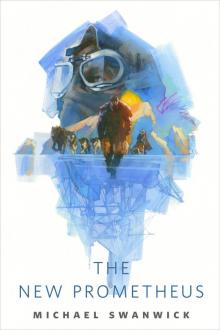 The New Prometheus
The New Prometheus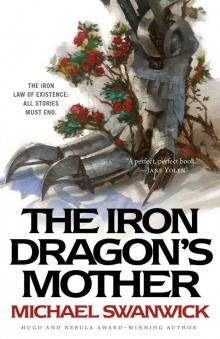 The Iron Dragon’s Mother
The Iron Dragon’s Mother The Mongolian Wizard Stories
The Mongolian Wizard Stories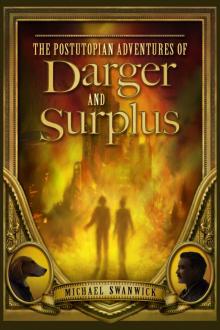 The Postutopian Adventures of Darger and Surplus
The Postutopian Adventures of Darger and Surplus Day of the Kraken
Day of the Kraken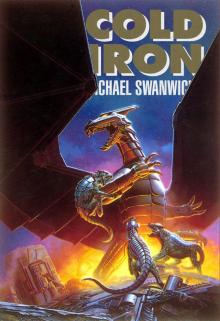 Cold Iron
Cold Iron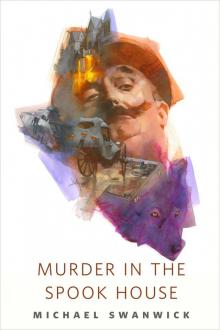 Murder in the Spook House: A Tor.com Original
Murder in the Spook House: A Tor.com Original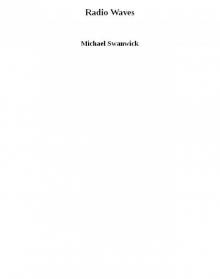 Radio Waves
Radio Waves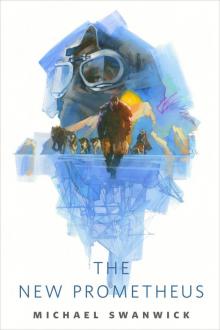 The New Prometheus: A Tor.com Original
The New Prometheus: A Tor.com Original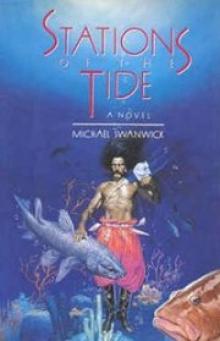 Stations of the Tide
Stations of the Tide Vacuum Flowers
Vacuum Flowers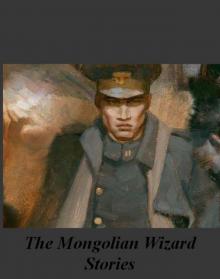 The Mongolian Wizard Stories (online stories 1-7)
The Mongolian Wizard Stories (online stories 1-7)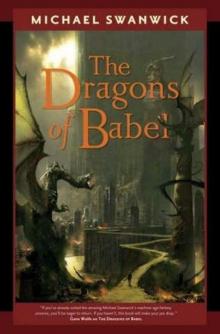 The Dragons of Babel
The Dragons of Babel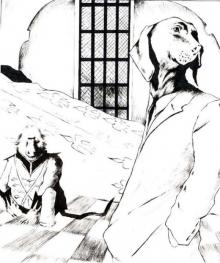 The Dog Said Bow-Wow
The Dog Said Bow-Wow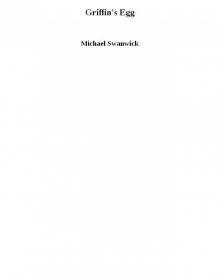 Griffin's Egg
Griffin's Egg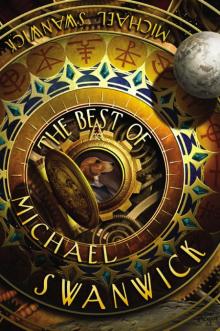 The Best of Michael Swanwick
The Best of Michael Swanwick Not So Much, Said the Cat
Not So Much, Said the Cat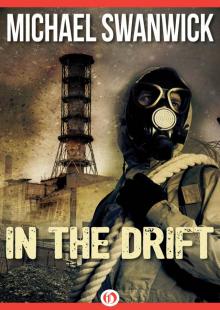 In the Drift
In the Drift Vacumn Flowers
Vacumn Flowers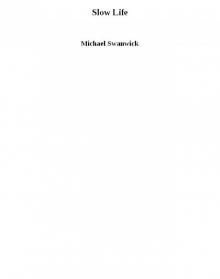 Slow Life
Slow Life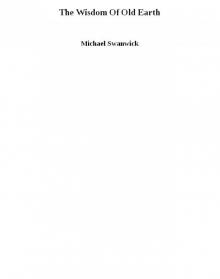 The Wisdom Of Old Earth
The Wisdom Of Old Earth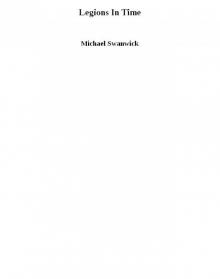 Legions In Time
Legions In Time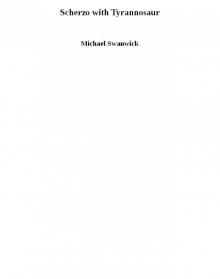 Scherzo with Tyrannosaur
Scherzo with Tyrannosaur The Year's Best Science Fiction (2008 Edition)
The Year's Best Science Fiction (2008 Edition)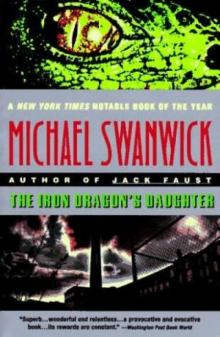 The Iron Dragon's Daughter
The Iron Dragon's Daughter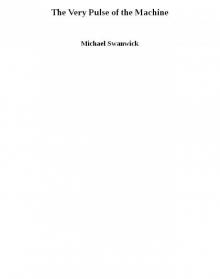 The Very Pulse of the Machine
The Very Pulse of the Machine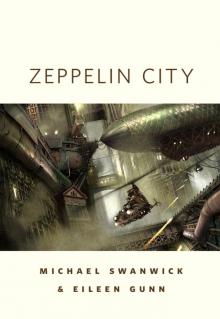 Zeppelin City
Zeppelin City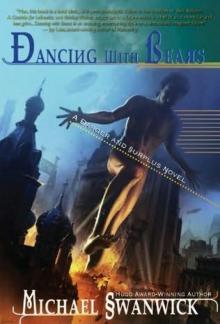 Dancing with Bears
Dancing with Bears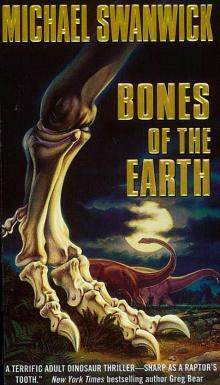 Bones of the Earth
Bones of the Earth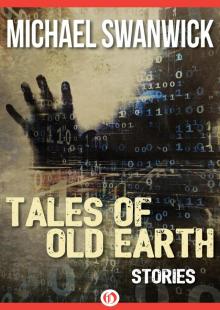 Tales of Old Earth
Tales of Old Earth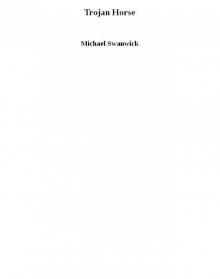 Trojan Horse
Trojan Horse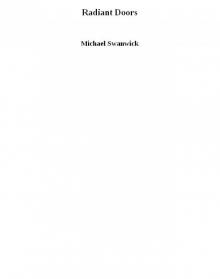 Radiant Doors
Radiant Doors